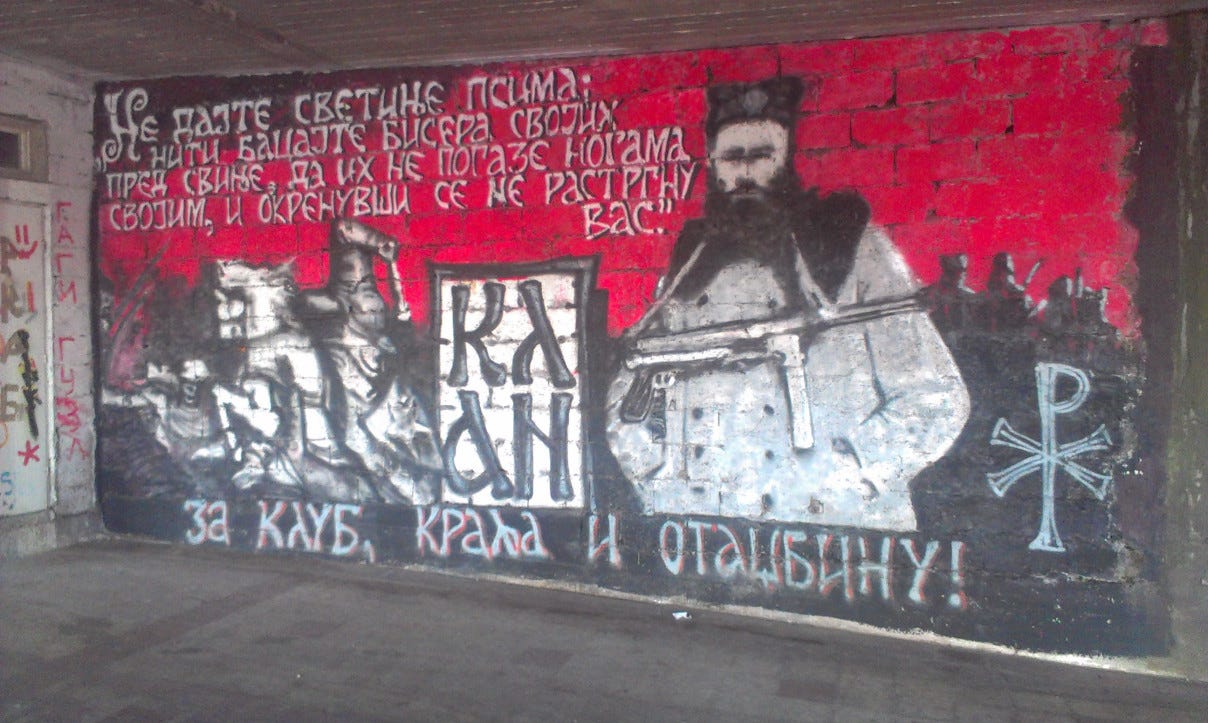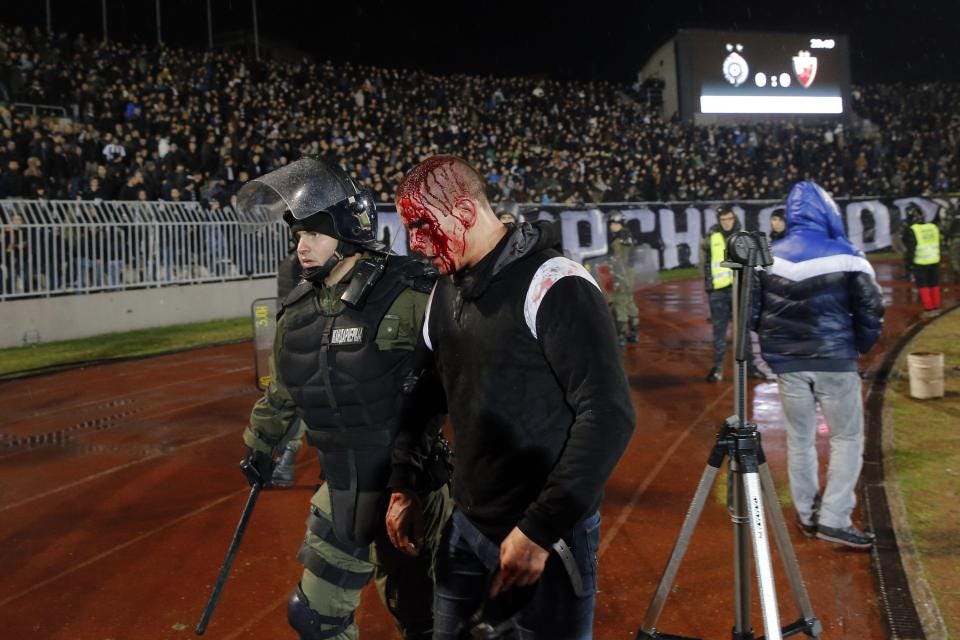S2E13. FK Hooligans Belgrade, ep. 2
This is the second episode in the world of Red Star and Partizan Belgrade fandom: the core of a network made of international cocaine routes and hidden relations with Serbian national politics
Hi,
welcome back to BarBalkans, the newsletter with blurred boundaries.
Last week, we began an in-depth analysis of the world of hooligans in Belgrade, with an overview of Serbian fandom’s recent history.
Wasting no time, today we are going to investigate the criminal environment in which the Red Star and Partizan Curve are rooted.
In this case, football rivalry has nothing to do with sport. It is only a pretext to give vent to the most violent instincts, or to sanction calculated business relationships.
A divided city
A road splits the centre of Belgrade in half. North of Cara Dušana is Red Star territory. To the south, it is Partizan’s domain.
The “eternal derby” is played not only on the playing field.
The north-west blocks are full of red-and-white murals representing bearded chetniks with weapons around their necks.
As soon as you cross to the other side of the road, the walls of the southern districts are marked with black-and-white skulls, the symbol of the “butchers” during the wars in the former Yugoslavia.
These are distinctive signs of hooligans marking their territory in the Serbian capital city.
It is certainly not an unusual phenomenon, neither in Europe nor around the world.
Football rivalry is a way of creating group identity and an aggregating factor for individuals.
Through a primitive psychology, people oppose to (or hate) someone else in order to define the boundaries of their own ego and to feel part of a community.
Sport is one of the most powerful levers of this collective feeling. And football, because of its popularity, is one of the most successful paradigms of self-exaltation.
In the interweaving of many social phenomena that coexist in the same city or country, it is easy that group identities are combined with non-sporting ideologies. Only then the political potential of fandom is revealed.
In Belgrade, this potential emerged with the wars in the former Yugoslavia, as we mentioned last week (you can read Twisted Curve here).
In the new millennium, the possibilities of influencing local and national politics have been amplified thanks to the conquest of top positions in the illegal markets.
Hooligans by day, criminals by night.
As the hooligans leaders have seized control over night clubs’ security, they are now able to manage the drug distribution in the city and to strengthen their authority inside and outside the stadium.
This position of power is not an end in itself, but involves directly the football clubs’ structures.
A kind of popular shareholding characterizes the management of the most established football clubs in Serbia, Red Star and Partizan above all.
All those who pay a membership fee are members of the club and cast a vote in the board to elect the president.
However, the presence of so many members inevitably leads to the emergence of self-organized bodies that control the elections. And this bodies respond to the hooligans leaders.
This is how politicians in Serbia look at the dynamics of football fandom with interest.
Both because it pulls the strings of the clubs, and because it influences the degree of violence in the criminal environment of the country.
Curve, weapons and cocaine
If we want to understand how powerful the Red Star and Partizan hooligans have become, we have to leave the Serbian borders.
In Kotor, a small town in the Adriatic hinterland of Montenegro, two mafia clans have been competing for years to dominate the international cocaine trade across the Balkans.
On one side is the Kavač clan. On the other side, the Škaljari clan.
The rivalry between the two Montenegrin mafia clans has caused the death of more than 150 people since 2015. Especially in Serbia, the real battleground for the control of the drug trade in the Balkan peninsula.
In Belgrade, hooligans groups represent the armed wing of mafia for the distribution of cocaine and the physical elimination of rivals.
Both the drug to be sold in night clubs and the firearms to guarantee security comes from Montenegro.
In Belgrade, hooligans/criminals have become more and more reliable partners, who are increasing their business and swelling the ranks of their groups.
The success of Partizan’s Janissaries is the most striking example.
The story of Janjicari began in 2013. The name is taken from the Ottoman sultan’s elite guard (from the 14th to the 19th century), composed only of Slavic boys captured as slaves or conscripted.
The hooligans group led by Aleksandar Stanković took possession of the southern stand of the Partizan Stadium and began its rise in the underworld of nightclub security and cocaine distribution in Belgrade.
Immediately, they formed an alliance with the Montenegrin Kavač clan, in order to hit the Serbian branches of Škaljari rivals.
Stanković’s power continued to grow until the autumn of 2016, when he was murder with 50 machine gunshots by two unidentified men, a few hundred meters from the Partizan Stadium.
Not even enough time to wash the blood off Stanković’s Audi A6 and the government led by then-Prime Minister Aleksandar Vučić was promising war on mafia.
Public opinion wondered why there was such a vehement response to the death of a hooligans leader, as if Belgrade had not witnessed dozens of other violent murders in those years.
It is no surprise that police operations only targeted the Škaljari clan. The enemies of the Kavačs, allied with Stanković’s Janissaries.
However, the ties to the police and politics survived.
The closest relationship was with Nenad Vučković, a senior police officer and special advisor to the security forces.
Member of the army’s elite brigade until June 2016, for the last five years he has been employed in the Gendarmerie, tasked with maintaining order during football matches and with fighting organized crime.
Vučković was captured hugging Stanković a few months before his death. He was recently spotted in the Partizan Curva again, but this time in the company of the Janissaries’ leader, Veljko Belivuk.
Belivuk is at the centre of one of the most important investigations in recent Serbian history, which may uncover all the submerged relationships of the hooligans/criminals in Belgrade.
Thanks to the tenacity of prosecutor Saša Ivanić, not only Belivuk, but also his right-hand man, Marko Miljković, and 15 other members of the criminal group were arrested by the Serbian police at dawn on February 4.
The crimes include five cold-blooded murders of rivals in the drug trade and illegal possession of weapons in the premises of the Partizan Stadium.
Ironically, on February 3, on the other side of the border the Montenegrin police prevented a planned attack by the Škaljari clan. Belivuk and Miljković were the targets.
Not only were the two hooligans saved, but Ivanić’s investigation also benefited.
Confirmation can now be sought on links with senior officials in law enforcement and national politics. One of them is Dijana Hrkalović, former State Secretary at the Home Office.
Before the end of her mandate in May 2019, Hrkalović is alleged to have meet several times Belivuk and to have used her influence within the police to pilot anti-mafia operations only against the Janissaries’ enemies.
Vučković, friend of the hooligans leader and romantically linked to the former Secretary of State, is alleged to have put the two in contact.
At the end of the preliminary investigation, on July 30, the suspects were indicted for drug and arms trafficking, murder and armed robbery.
During interrogations, Belivuk denied any involvement in the murders, but confesse close relations with Vučić.
It is worth mentioning that Aleksandar Vučić is now the President of the Republic.
For example, the leader of the Janissaries claimed to have organized the security of a rally of the Serbian Progressive Party (currently in government) and of the Belgrade Pride (a particularly delicate event, due to attacks by the far-right movements). He stated that he prevented violent reactions by hooligans groups.
It is still unknown what he received in return. But it is likely a sort of pax hooligans: no violence outside the stadium, in exchange for a closed eye on criminal trades.
Many pieces are still missing and prosecutors hope to trace them down during the trial.
However, President Vučić may not come out clean, as journalists have been reporting for years.
It is not only his son Danilo Vučić who has well-established friendships with the Janissaries’ leaders. But even the head of State himself is alleged to have not severed the ties with the hooligans world, as he has always boasted to have been a member in his youth.
In 2017, some hooligans were hired to provide security for his inaugural ceremony as President of the Republic.
Moreover, Belivuk claims to have met him several times in recent years, thanks to the mediation of Aleksandar Vidojević.
Another hooligan/criminal from the south stand of the Partizan Stadium.
Another thread in the international network of Europe’s most brutal fandom.
Pit stop. Sittin’ at the BarBalkans
We have reached the end of this piece of road.
After last week’s stop at the Red Star Brewery in Formby, today we cross to the other side of Belgrade.
But we remain in the UK. To be precise, in Sneinton, a suburb of Nottingham, where the micropub Partizan Tavern opened last July.
Tony Perkins, a Serbian Superliga fan with a soft spot for Partizan Belgrade, is the mind behind the project.
Instead of buying a ticket to watch a football match at the stadium, he founded a pub and named it after his favorite Serbian team.
The Partizan Tavern has no dependence on big brands, has a wide choice of beers in rotation and the freedom to make deals with suppliers from all over Europe.
Even in Serbia, trying to link even more to the south stand of Partizan Stadium.
Let’s continue the BarBalkans journey. We will meet again in a week, for the 14th stop.
A big hug and have a good journey!
BarBalkans is a free weekly newsletter. Behind these contents there is a lot of work undertaken.
If you want to help this project to improve, I kindly ask you to consider the possibility of donating. As a gift, every second Wednesday of the month you will receive a podcast with an article about the dissolution of Yugoslavia.
Every month you can listen to the preview of BarBalkans - Podcast on Spreaker and Spotify.
Pay attention! The first time you will receive the newsletter, it may go to spam, or to “Promotions Tab”, if you use Gmail. Just move it to “Inbox” and, on the top of the e-mail, flag the specific option to receive the next ones there.
As always, I thank you for getting this far with me. If you are interested in football, you may be interested in this previous newsletter (while here you can find all the others):
BarBalkans is on Facebook, Twitter and Instagram. The updated archive is on Linktree.











